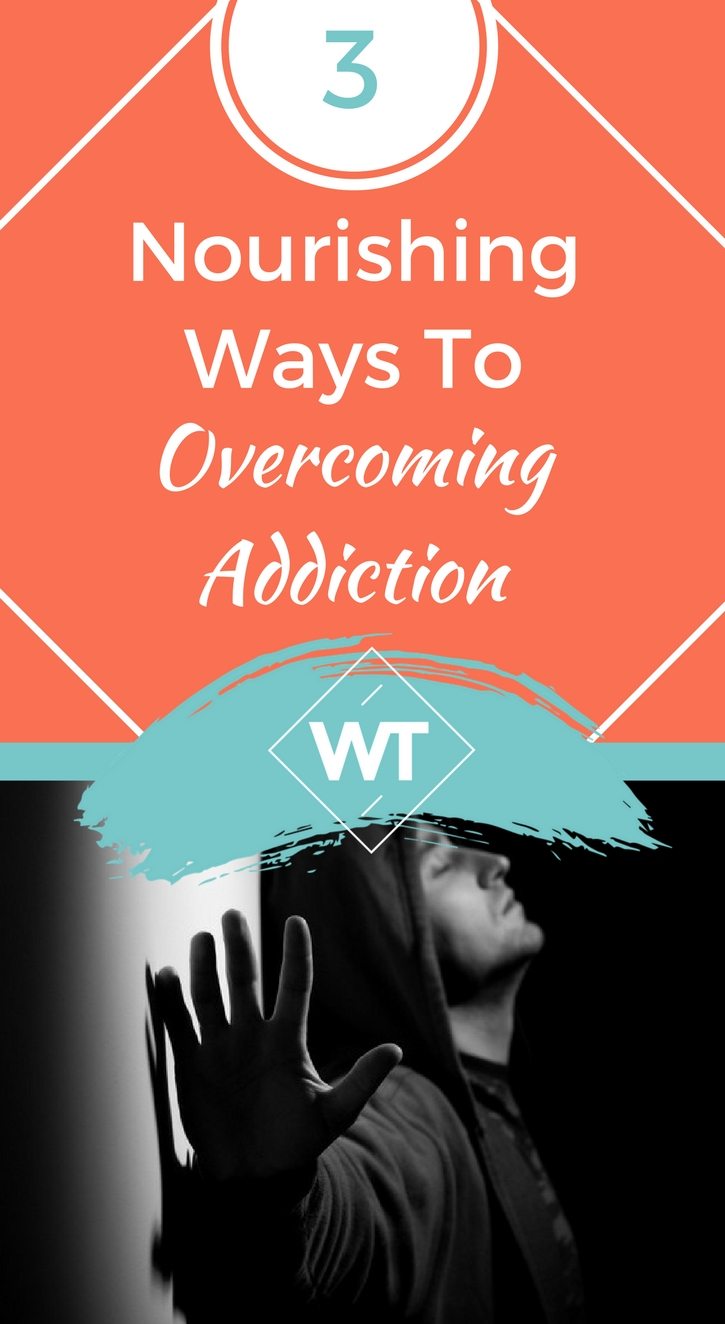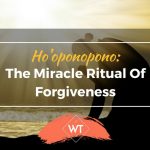3 Nourishing Ways to Overcoming Addiction


Addiction takes many forms—from the common; drugs, alcohol, sex, and food to the unusual; coffee, pornography, and even work. Though a seemingly convoluted matter, there’s truly no mystery to addiction. How it forms is due to a simple process of the human mind; we experience pain, and then as a “way out” we do something that gives us pleasure, and then it becomes habitual.
You could say we are all addicted to something right now. The difference between harm and help is in the outlet. While some choose drugs, others choose healthy foods. Both, however are trying to achieve the same thing, bliss. Really, an addict is nothing but a misguided seeker, victim only to their own harmful solutions.
Overcoming addiction means leaving the playing field of addiction all together. Many of the solutions to healing addiction have been focused on treating mere symptoms of the problem—creating a never-ending cycle. Trying to solve a problem at the level of the problem only infuses anger, fear and despair into every possible solution.
Life is meant to be a celebration! It shouldn’t be necessary to set aside special times to remind us of this fact. Wise is the person who finds a reason to make every day a special one. ~ Leo F. Buscaglia (Tweet this)
The Misguided Seeker
What do drugs, sex, and alcohol all have in common? They give space. In a way they are almost transcendental. When we partake in these substances we bypass the mind—the jail cell that creates our emotional pain in the first place. In this way, it’s easy to conclude that all “users” are just seeking more space, transcendence.
Addiction begins by looking for the right thing in the wrong place. ~ Deepak Chopra (Tweet this)
The misguidance is due to looking for space in the wrong places. Instead of nourishing outlets, they are gaining space in ways that are poisonous and harmful to the body. Perhaps this is due to the encouragement and societal acceptance of substances like sugar, alcohol and cigarettes. Whereas joy—especially experienced unconditionally—is thought to be crazy and therefore repressed.
Consider the judgment one passes when they see an elderly person playing on the playground. Our first inclination is to consider this person displaced and obviously mad. So what do they (most people) do? Go back to the office and drug up on a mocha-sugar latte to achieve bliss in a more socially-accepted manner.
Move beyond addiction. Perhaps the most radical cure for addiction would be unconditional happiness—getting there socially may take time however.
Take a chance! All life is a chance. The man who goes the furthest is generally the one who is willing to do and dare. ~ Dale Carnegie (Tweet this)
The starting point is to stop seeing addictive behavior in black and white. Rather than shunning addiction as bad—admitting it is nothing to be proud of either—we should be looking at it with more curiosity. What is the behavior telling us? The obvious pleasure seeking tells us there is an aspiration toward a higher level of experience.
A New Solution to Overcoming Addiction
The real task in overcoming addiction lies not in pointing out its negative effects but in reawakening the spirit deep in each of us.
Knowing what drives addictive behavior, we can go about providing a more appropriate fix. The habitual pattern in addiction forms because ultimately the aspiration for transcendence is never truly fulfilled by chemicals and compulsive behavior.
Freedom from addiction sounds like an impossible feat to someone who doesn’t know that they’re already unconditionally free. Truthfully, there is no fix more effective than transcendence—moving beyond the self-image into the self. Looking at most treatments for addiction they are no more than that, treatments. They are rooted in fear, stuck in the past and fearful of the future—all of which are qualities of the self-image of an addict.
A true cure for addiction would focus on leveraging the freedom of the present moment. In order to step into the present moment we have to begin nurturing the spirit correctly. Just as we have a basic need for food, we also have the need for “spiritual satisfaction.”
Here are a few nourishing ways to overcoming addiction and feeding the spirit:
1. Creative arts
Music, drawing, poetry and the many expressions of creative art are all transcendental experiences. They give a “spiritual satisfaction” that is unlike any drug. When we listen to music we become in tune with our inner perfection.
Playing music has an even stronger effect on engaging us in unbounded consciousness. Supplementing drugs, food, and other substances with music is a fantastic way to meet the true needs of an “addict.” As we know, they are not hungry for food alone, but the transcendence it provides.
Creative arts; of course, comes without the disastrous side effects that most addictions come with. If the idea of starting an instrument intimidates you for now (though that’s probably even more reason to start) at least start with listening to more music.
Whatever kind you enjoy, it doesn’t matter. I will say that modern music has a tendency to introvert, whereas classical music extroverts and brings us out into existence.
2. Meditation
One of the most remarkable aspects of mediation is its power to encompass seemingly disparate states of mind into a single experience. The mind is always working, procuring a million and one ideas a minute. One thought leads to another and in no time we have created a false world that stretches the course of the day.
Most of us are spending more time thinking than we are living. Meditation is a practice that allows us to put the mind to rest once and for all. Through meditation we awaken the observer of existence within us. By simply watching our mind we step into a powerful truth; we are not our minds, but the ones watching it, the ones operating it.
First, we become aware of our existence as the observer—just by watching a river flow, seeing the life in it happens spontaneously without the need of our thinking. Then gradually, we learn that this place of silence is a place of strength from which we can influence all areas of our lives. Rather than forcing change, we can flow with the effortless nature of life.
In meditation, we watch the mind as it creates its demands—the mind wants to fight but spirit knows the river of life always leads to the ocean. In that watchfulness we plant a seed of a new intention. And just as the water of a river effortlessly flows, when we surrender to the flow of life all need to struggle dissipates.
3. Movement
The true purpose to exercise is to invigorate the connection of mind, body and spirit. Although exercise itself has taken form of addictive behavior—being reduced to fragmented forms of competition and extreme physical demands—this is clearly not the path for healing and overcoming addiction.
Thinking of exercise as movement alone shifts us to its true purpose. From there, it’s important to see movement as an opportunity for understanding. When we move our bodies we can listen to the sensations that pass through us. Because spirit, mind and body are interconnected these sensations can tell us a lot about what we think and feel—ultimately guiding us to our true needs.
What can you learn about yourself physically and emotionally through movement?
If addiction has been an issue you may learn that you’re decidedly out of shape. You may see the characteristics of addiction projected at your forefront as you feel the desire to want to stop too soon, or continue too long.
These are valuable insights that are just as important, if not more so, than the physical benefits of movement. In this way, movement can become a tool for opening the communication that has been long broken between your spirit and physical self.
As a few basic guidelines: only exercise to half capacity, exercise daily, focus on proper form, and aim to feel energized, focus on your breathing, and above all have fun! Always aim for natural movements, probably avoiding machines and most conventional forms of exercise.
Yoga, Thai Chi, dancing, walking, and swimming are all very natural forms of movement that enliven the mind-body-spirit connection most fully.
As a final word, we could say that addiction is defined as not getting enough of the thing we most don’t want. The funny thing about life is that we don’t get what we want and get what we don’t want. It is the natural push and pull of the universe.
If this sounds too mystical to you just consider a relationship; we fight for a person with no result; then as soon as we pull away the other comes chasing. That’s because if you push toward something it has no choice but to withdraw. If you pull back you create a void and it is the Universe’s job to fill that void.
Therefore, ultimately overcoming addiction is the task of making the thing we most don’t want, incredibly desirable. There is no more holistic way of doing this than stepping into spirit.
In spirit, we lack nothing and therefore need nothing. With this type of totality of being, things gravitate towards us. And because of the nature of spirit, we will always attract to us the things that reflect its divinity. Ultimately it is the power to move beyond addiction and nurture the relationships to make a world better place to live in.








Leave a Reply